
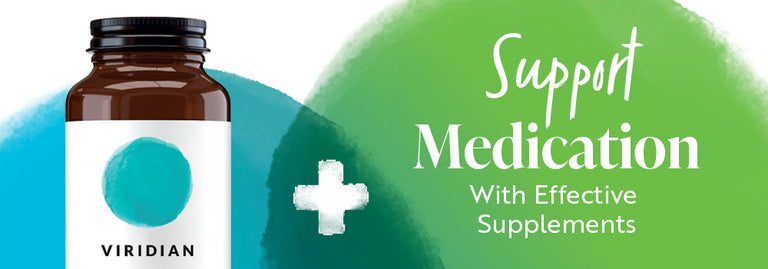
Did You Know Your Medication Could Be Impacting Your Nutrition?
Read on for advice from NHS GP Dr Siobhan Brennan and qualified Nutritionist Phil Beard

The Hidden Impact
Medications are powerful tools to help manage a range of illnesses and diseases, but can also come with a variety of side effects, commonly resulting in nutrient deficiencies. Nutrient depletion is very rarely listed in leaflets as a side effect, but many common medications can cause deficiencies, especially when taken long term.
It's important to always dig deeper, to ensure you are nutritionally supported whilst on long term medication.
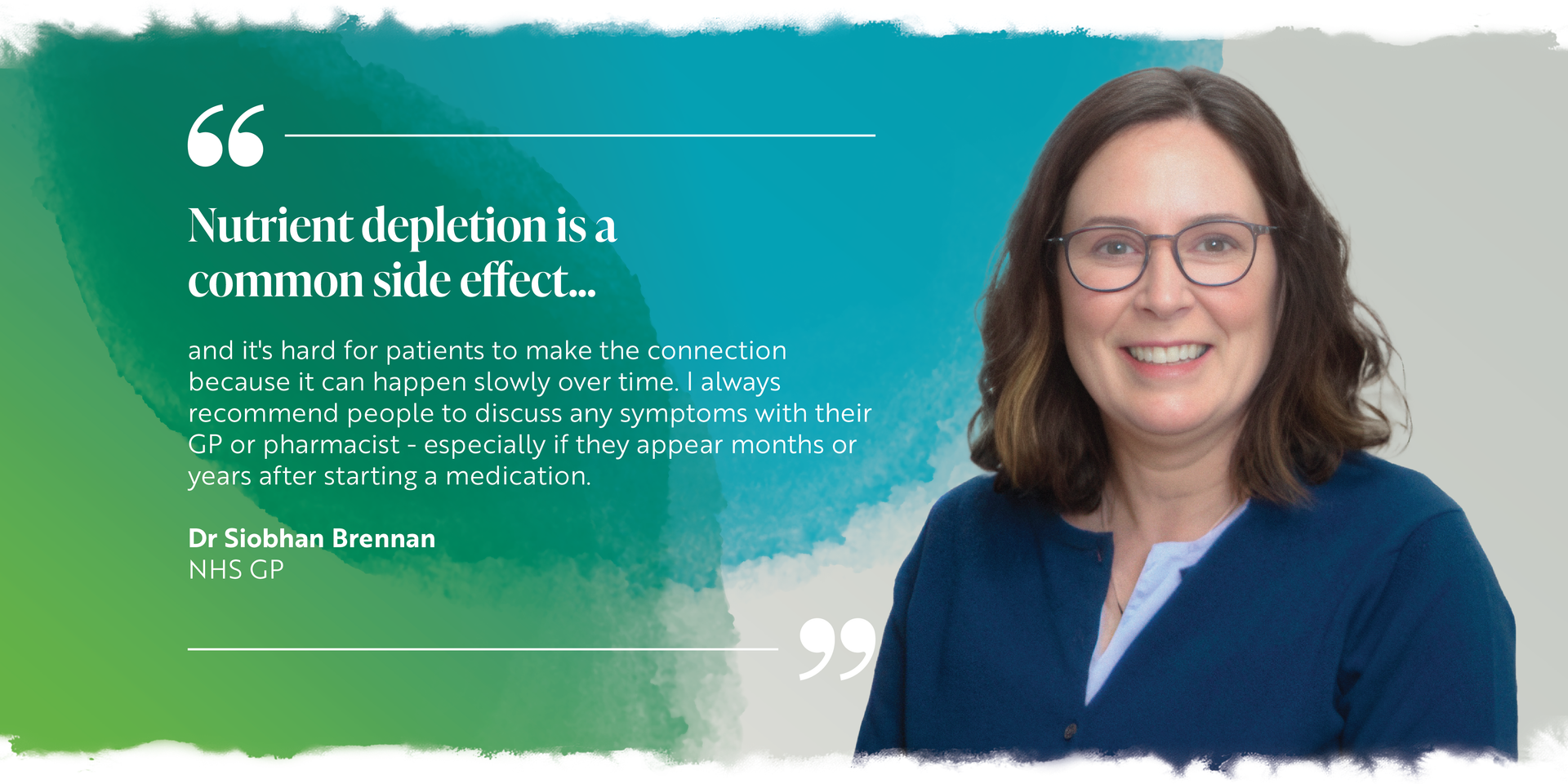
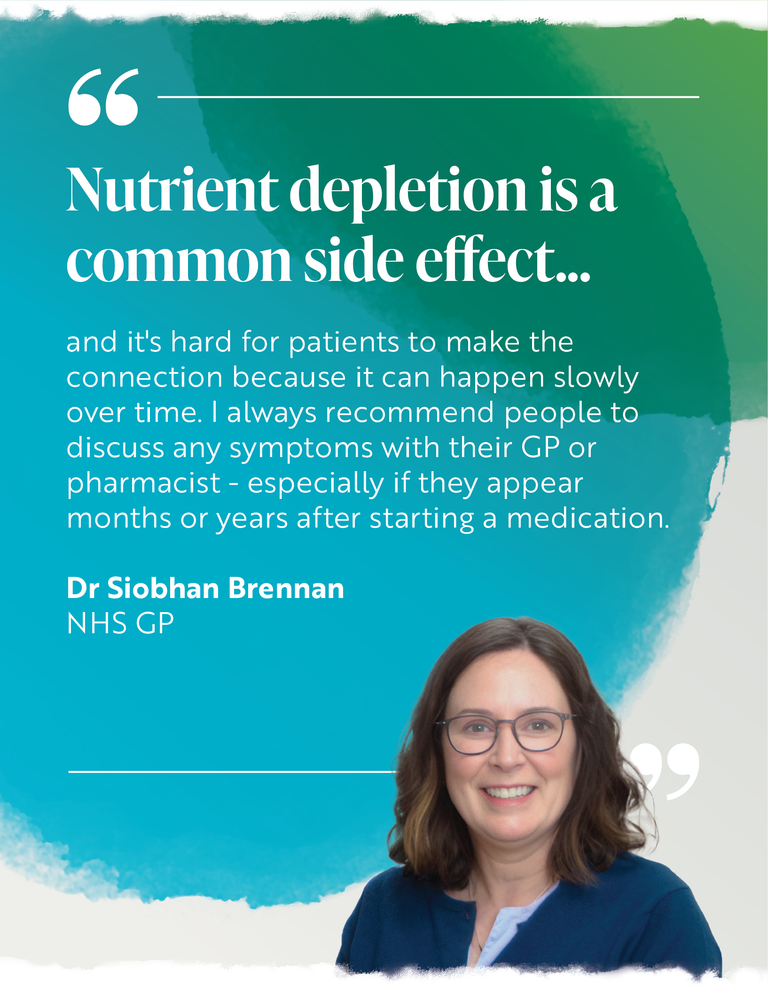
What To Look Out For?

Digestive Upset
Bloating, nausea and changes in your digestion can be caused by medication impacting your gut microbes.

Muscle Aches
Depletion in certain nutrients can result in symptoms such as, muscle weakness, aches and tenderness.

Fatigue
With less nutrients, you can experience a lack of energy, feeling weak with tiredness which doesn’t go away.

Timing
Symptoms aren’t always immediate. They can appear months or years after starting to take medication.

Anything Unusual
If you don’t feel right, keep a record/diary of your symptoms and speak to your GP or pharmacist.
Supporting Medication with Effective Supplements
Viridian Nutrition have teamed up with NHS GP Dr Siobhan Brennan, to provide more experience on this subject and to give you the support you might need.
Common Medications & Nutrient Depletions
Dig deeper and explore the most common medications, which could deplete your nutrient status.

Nearly 1 in 10 people are living with diabetes. Medications such as metformin have been found to deplete vitamin B12 and folate. Studies have shown supplementing with these nutrients can help, particularly in managing cholesterol and supporting kidney function.

HRT has been linked to similar nutritional deficiencies as contraceptive pills. A comprehensive multivitamin including folic acid, vitamins B6, B12, C & E, as well as magnesium and zinc can provide support.

Statins are designed to help reduce cholesterol. But they can reduce absorption of vitamins A,D,E & K, beta carotene, and also Co-Q10 levels. Co-Q10 is needed by the muscles (including the heart) and also for energy. Studies show supplementing with Co-Q10 can alleviate muscles aches.

40% of women aged 16-50 take the contraceptive pill which is linked to depletions in folic acid, vitamins B6, B12, C & E, as well as magnesium and zinc. Studies have shown supplementing with a multivitamin can reduce side effects such as nausea and mood changes.

Depression is strongly linked to other long term health conditions. Key nutrients evidenced to improve symptoms include omega 3, B vitamins, vitamin D, magnesium and vitamins A & C.

With almost 2/3 of people overweight or obese, there is a growing demand for weight loss medication. These limit nutritional intake or can additionally reduce the absorption of fat soluble vitamins (A,D,E,K). A multivitamin is a recommended top up.
Explore other Medications and Ailments
Learn More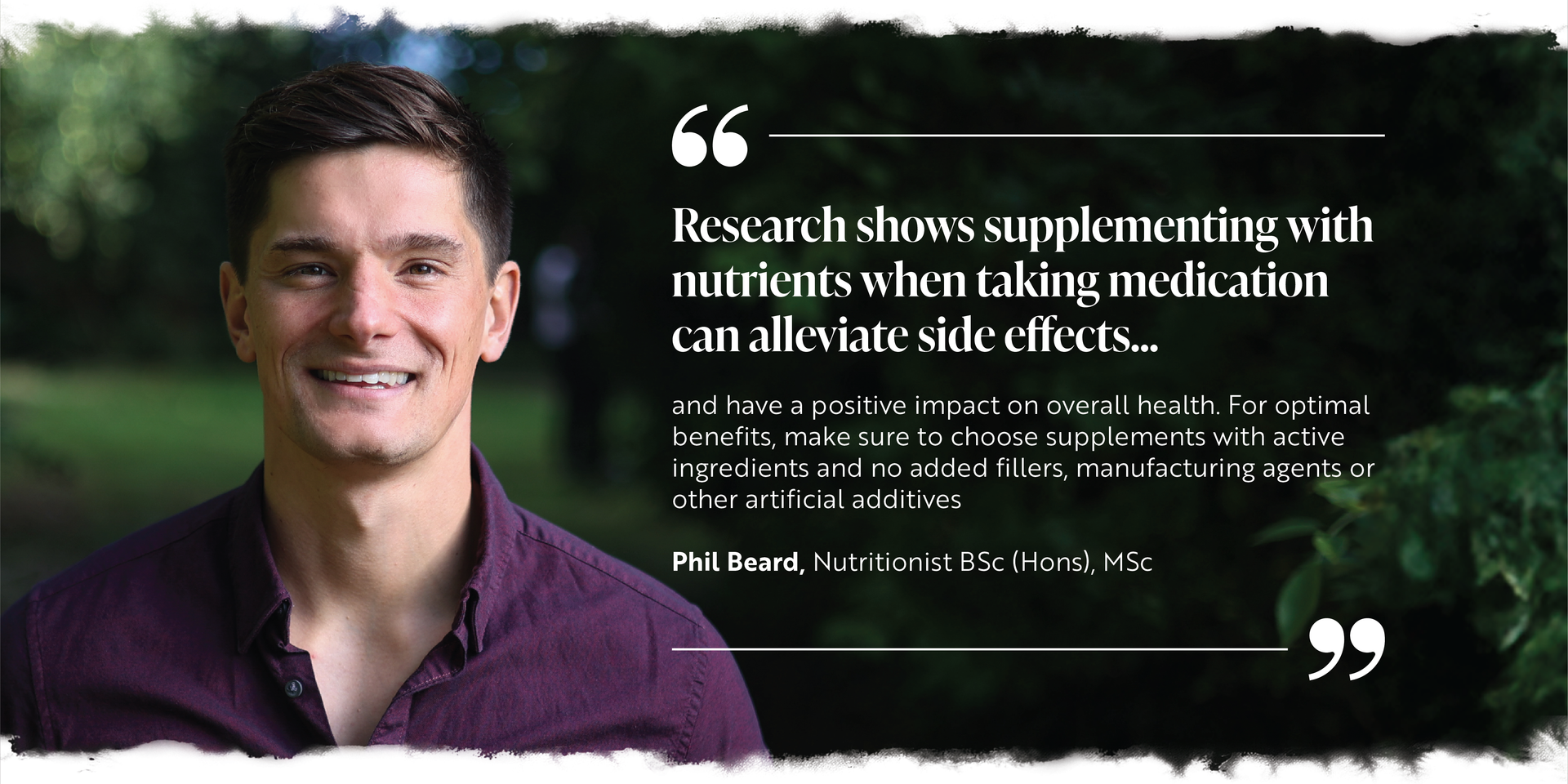
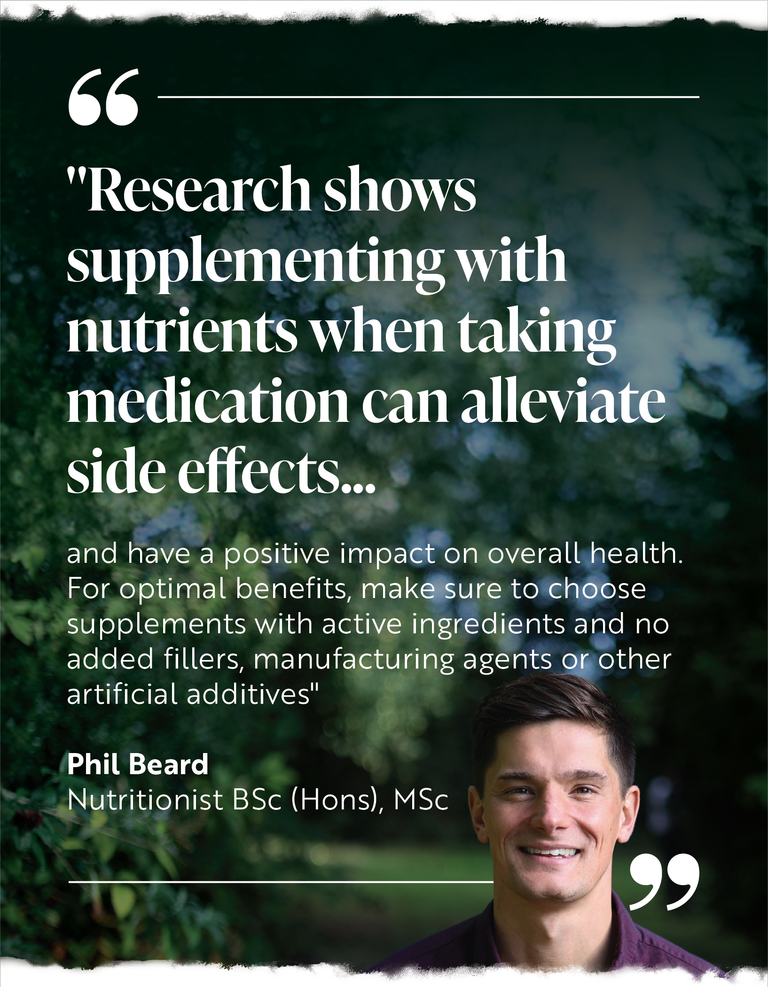

Get Your
Free Guide
Find a local independent health store to pick up your free guide
Doctor and Pharmacist Advice
Highlighted below are the key points to consider, when thinking about taking nutritional supplements, whilst on medication.

Review
Schedule an annual medication review with your GP or pharmacist. This is a great time to check in on how you are feeling. It will ensure you are taking the right medications, including addressing whether any can be removed to make sure you aren't taking them for too long.

Monitor Symptoms
Keep a diary to monitor your symptoms and track how you feel. Even if new symptoms appear months or years after taking a medication, they are important to talk about with your health practitioner, so any issues can be addressed and medications adjusted accordingly.

Blood Test
If you have concerns your GP may organise a blood test (or you can book this privately) to check for deficiencies in key nutrients such as iron, vitamin B12, vitamin D, magnesium and folate. Visit your local independent health store for supplement advice.

Multivitamins
Consider a multivitamin. Although not a substitute for a healthy and varied diet, opting for a clean formulation multivitamin (without fillers, binders and other additives) will provide a good foundation level of core vitamins and minerals. Check with your GP on whether this is right for you.

Ultra-Processed Food
Reduce intake of ultra-processed foods, which are full of additives and lacking in vitamins and minerals. Prioritise a whole-food diet rich in varied, colourful plants (aim for 30 different varieties weekly) to maximise nutrient intake.

Physical Activity
Don't forget that keeping active has both physical and mental benefits, and can help reduce the risk of long term health conditions. It doesn't have to be strenuous, walking, gardening or yoga, can really help to support your wellbeing.
Frequently Asked Questions
We hope to answer any queries below, but if you're still not sure feel free to contact our nutritionists via live chat, or visit a local health store.
Should I stop taking my medication if it depletes nutrients?
No, stopping medication should only be done with the guidance of your GP, or other prescribing healthcare practitioner. Medication is doing a job, and stopping some medications needs to be done with a gradual tailoring off approach. If you want to explore coming off any medication you must do it under their supervision.
Should I reduce my medication to help prevent deficiency in the nutrients mentioned?
Again, this would need to be done after discussion and with monitoring from your GP or other prescribing practitioner. Some nutrients can have ‘drug sparing’ interactions, for example magnesium may lower blood pressure, which if combined with blood pressure lowering medication may cause the blood pressure to lower too much, causing dizziness. In this case you could discuss this with your GP, and with monitoring of your blood pressure, it may be that they would consider lowering your medication dose. This must be done though under their supervision.
How long should I wait between taking medication and taking supplements?
Some nutrients can bind to medication, making both less available to be absorbed. The best advice is to take them at least 4 hours apart to maximise the effectiveness of both.
Do I need to supplement if my medication lowers a nutrient, or can I increase foods rich in the nutrient?
Increasing nutrient dense foods in the diet is always the first port of call to ensure good nutrient status, so, yes, we would advocate this approach. If you have been on medication for a long time, or your diet is not as ideal as you would like then supplementing can be an excellent way to improve nutrient status.
Can I get my nutrient levels tested to see if I am low?
Your GP can test for some nutrients like vitamin B12, folic acid/folate, and vitamin D, so if you suspect you might be low in these, speak to them about the possibility of testing with a blood test. Many nutrients are actually hard to test for, so often the best indicator is if you feel you have some of the deficiency symptoms. If your medication is not contraindicated with the nutrients in question, try increasing in your diet, or with supplementation and see how you feel.
How long might I need to take the nutrients for if my medication depletes them?
This can depend on your medication, your diet, and you as an individual. Many factors can increase our need for nutrients, like stress. If you take medication for short periods of a few days to a week or two, it is less likely deficiency will occur. However, if you have taken medication for longer or ongoing periods, or you take several medications which deplete the same nutrients the risk is increased. In this instance you may wish to supplement on an ongoing basis, or at least until your levels return to within typical parameters if tested.
Why are blood thinning medications such as warfarin not mentioned?
Blood thinning medication can be difficult to combine with some nutrients which may affect the way your blood clots, causing medication to be less or more effective. If you are taking blood thinning medication, we suggest you speak with your GP if you have any concerns about potential nutrient deficiency or wish to take any supplements.
My medication is not listed, does that mean it doesn’t deplete any nutrients?
We have included medications based on current research information available. Not all medications deplete nutrients, so if yours is a commonly prescribed medication and not listed, there is no evidence to show it depletes nutrients (aside from blood thinning medications – see question above).
Is there anyone else who can give me advice, other than my GP?
Your pharmacist is a good person to speak with regarding medication and nutrient deficiency. You can also contact our expert Nutrition Advisors who can give you advice but be prepared that they might also ask you to refer to your GP or Pharmacist.
Vitamin D is recommended by government health experts, but my medication depletes it. Do I need to take extra?
Likely yes, you might need to take over and above the 400iu currently recommend by health experts, especially during winter months. The upper tolerable or safe intake for vitamin D is set at 4000iu in the UK, so always stay well below this level though. More is not always better!
How do I know how much of a nutrient to take if my medication is thought to deplete it?
This a difficult to question to answer as it will depend on many factors and will be individual to the person. One of the best places to start would be to take a multivitamin and mineral which provides smaller levels of numerous nutrients (aside from calcium and magnesium) and see how you get on for several months. If you need advice on which supplements would be most suitable for you, head into your local independent health store who have a wealth of advice.
How should I check if there are any interactions between supplements and my medication?
Contact our Nutrition Advisors via our webchat, email on phone on our contact page. We use the Gold Standard Industry Database for checking potential interactions and can flag these up for you and give you some advice on whether to proceed or whether you need to check further with your GP before taking.




